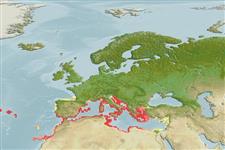>
Eupercaria/misc (Various families in series Eupercaria) >
Labridae (Wrasses)
Etymology: Symphodus: Greek, syn, symphysis = grown together + Greek, odous = teeth (Ref. 45335).
More on author: Linnaeus.
Environment: milieu / climate zone / depth range / distribution range
Ekologi
laut dasar (demersal); kisaran kedalaman 1 - 50 m (Ref. 5292). Subtropical; 45°N - 32°N, 32°W - 36°E
Eastern Atlantic: Portugal to northern Morocco, including Azores and Madeira and also throughout the Mediterranean.
Length at first maturity / Size / Weight / umur
Maturity: Lm 9.0 range ? - ? cm
Max length : 18.0 cm SL jantan/; (Ref. 4742); common length : 12.0 cm SL jantan/; (Ref. 4742); Umur maksimum dilaporkan: 8 Tahun (Ref. 4742)
Adults are found mainly in eel-grass beds. Often in pairs. Males nest-makers. Feed mainly on mollusks, gastropods, bivalves, tubicolous worms, chitons, sea urchins and bryozoans (Ref. 4742). Oviparous, distinct pairing during breeding (Ref. 205).
Oviparous, distinct pairing during breeding (Ref. 205). Males build dish shaped nests and guard the eggs (Ref. 205).
Quignard, J.-P. and A. Pras, 1986. Labridae. p. 919-942. In P.J.P. Whitehead, M.-L. Bauchot, J.-C. Hureau, J. Nielsen and E. Tortonese (eds.) Fishes of the north-eastern Atlantic and the Mediterranean. UNESCO, Paris. Vol. 2. (Ref. 4742)
Status IUCN Red List (Ref. 130435)
ancaman kepada manusia
Harmless
penggunaan manusia
Perikanan: perikanan swasembada; Ikan buruan: ya; Akuarium: Komersial
Alat, peralatan
laporan khas
muat turun XML
Sumber internet
Estimates based on models
Preferred temperature (Ref.
123201): 16.2 - 21, mean 18.5 °C (based on 106 cells).
Phylogenetic diversity index (Ref.
82804): PD
50 = 0.5005 [Uniqueness, from 0.5 = low to 2.0 = high].
Bayesian length-weight: a=0.00977 (0.00779 - 0.01225), b=3.06 (3.02 - 3.10), in cm total length, based on LWR estimates for this species (Ref.
93245).
Trophic level (Ref.
69278): 3.2 ±0.2 se; based on diet studies.
Generation time: 2.3 ( na - na) years. Estimated as median ln(3)/K based on 2
growth studies.
Daya lenting (Ref.
120179): sedang, Waktu penggandaan populasi minimum 1.4 - 4.4 tahun (K=0.47-0.63; tm=2-3; tmax=8).
Fishing Vulnerability (Ref.
59153): Low vulnerability (23 of 100).
Nutrients (Ref.
124155): Calcium = 158 [83, 343] mg/100g; Iron = 1.47 [0.72, 3.01] mg/100g; Protein = 18.4 [15.5, 20.4] %; Omega3 = 0.384 [0.230, 0.669] g/100g; Selenium = 20.6 [11.1, 41.6] μg/100g; VitaminA = 18.2 [5.6, 70.8] μg/100g; Zinc = 1.14 [0.78, 1.94] mg/100g (wet weight);
